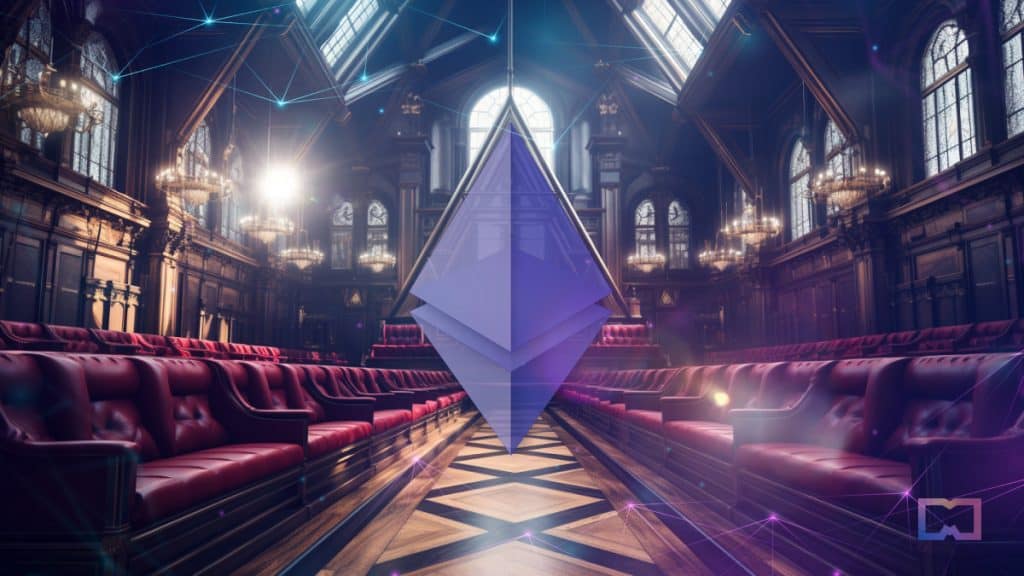Matter Labs Co-Founder Proposes Creation of Judicial System for Dispute Resolution on Ethereum

Matter Labs co-founder and CEO Alex Gluchowski Gluchowski's idea of an 'Ethereum Supreme Court' is designed to function like real-world judicial structures, offering a comprehensive solution for resolving disputes in the growing ecosystem of Ethereum smart contracts.
On September 2, Gluchowski tweeted about his idea for an 'Ethereum Supreme Court,' a judicial body akin to the Supreme Court of the United States. This proposed court would act as the ultimate authority for resolving issues around smart contracts, aiming to reduce reliance on conventional legal pathways.
Gluchowski highlighted the critical importance of such a system in defending Ethereum's protocols from external political pressures. He emphasized, 'The primary role of this proposed system will be to shield protocols from outside political influences, acting as a significant deterrent and enhancing Ethereum's stature as a formidable network state.'
According to Gluchowski’s plan, disputes and urgent upgrades to protocols would be managed through a tiered system of on-chain courts, with the ultimate judicial power residing in a soft fork of Ethereum layer-1, dubbed the 'Court of Final Appeal.'
Under this proposed structure, each protocol will possess its own governance framework, including mechanisms for regular and emergency updates, along with a specialized contract for initiating appeals.
A Thorough On-Chain Dispute Resolution Framework
Gluchowski clarified that if a protocol undergoes an emergency upgrade, there would be a designated appeal timeframe. Users could file a challenge to a higher court during this period, contingent on deposit requirements.
Furthermore, he explained that every court would specify which higher court appeals could be directed to, with the Ethereum Supreme Court being the final option for any challengers.
Following the proposed structure, protocols such as Aave and Uniswap would navigate legal disputes through platforms like CourtUnchained or JusticeDAO. Based on these courts' decisions, involved parties could escalate their grievances to the Ethereum Supreme Court.
However, Gluchowski acknowledged that for this on-chain court system to function effectively, it relies heavily on a strong social consensus. Moreover, he pointed out that the system would involve considerable financial implications, ensuring that only truly significant cases would be entertained.
Making his argument, Gluchowski addressed the shortcomings of the current dispute resolution mechanisms within the blockchain realm.
He suggested that time-locked features on smart contracts might not be adequate for urgent scenarios. Additionally, while setting up a security council might alleviate certain challenges, it also brings forth potential risks.
Such a council could pause a contract temporarily, necessitating token governance approval for emergency upgrades. Still, this method might leave room for exploitation by undercollateralized stakers.
Gluchowski reiterated his and the zkSync team's commitment to financially support research into this pioneering proposal.
In an In an exclusive interview with the Metaverse Post, Gluchowski detailed his aspirations for boosting Ethereum's scalability while developing a layer-2 protocol designed for what he describes as 'hyperscale.' This vision aligns with his fundamental belief in the infinite scalability of zero-knowledge proofs. This initiative is guided by a detailed engineering roadmap and a clear vision for the protocol's ultimate form, which remains confidential.
Gluchowski mentioned that Matter Labs is on the verge of unveiling an open call for research and development topics to promote collaboration.
'We are looking forward to supporting, investing, and helping others build different facets of the protocol,' Gluchowski shared, reflecting the spirit of a decentralized and all-encompassing blockchain ecosystem.
This innovative proposal from Alex Gluchowski marks a pivotal move toward enhancing the efficiency and safety of the Ethereum blockchain, reinforcing its role as a powerful and self-sufficient environment for smart contract ventures.
Please remember that the information featured on this page is not intended as legal, tax, investment, financial, or any other form of advice. It’s essential to invest responsibly and seek independent financial guidance if you have any uncertainties. For further details, we recommend consulting the terms and conditions, as well as help and support resources offered by the issuer or advertiser. MetaversePost dedicates itself to delivering precise and impartial reporting, but market conditions can change without notice.
Disclaimer
In line with the Trust Project guidelines Victor serves as a Managing Tech Editor/Writer at Metaverse Post, focusing on topics like artificial intelligence, cryptocurrency, data science, the metaverse, and cybersecurity in the business sector. With five years of media and AI experience at prominent outlets like VentureBeat, DataTechVibe, and Analytics India Magazine, he is also a Media Mentor at prestigious institutions, including Oxford and USC, holding a Master’s degree in data science and analytics. Victor is dedicated to keeping readers updated with the latest and most insightful stories from the Tech and Web3 environments.


